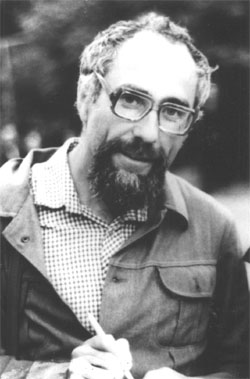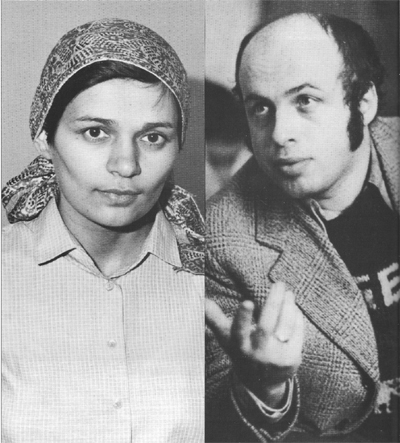 Yosef Begun
|
Born in 1932, in Moscow, in a assimilated family, though his father was brought up in a Belorussian Jewish shtetle and even studied in a yeshiva. In the mid-sixties, trying to comprehend the terrors of Holocaust and in search of his Jewish roots he met an old Jew, a member of a synagogue, and started to take Hebrew lessons from him. Later, after the Six-Days War he got acquainted with Moscow Zionists – K. Malkin, D. Havkin, V. Svechinsky, etc. He continued to learn Hebrew, was engaged in distribution of Zionist literature and participated in the meetings of Zionists. In January of 1971 he signed a letter of protest against the harsh sentences to the members of the "Aircraft Trial", and as a result of this lost his job. In March of 1971 he tried to apply for the exit visa to go to Israel, but they refused even accept his documents. Finally in several months the documents have been accepted, but he was denied the exit visa because of the "knowledge of the classified information». The first time he was arrested in March, 1977, for «a parasitic way of life» (though he applied to the authorities with the request for an official recognition of teaching of Hebrew as a labour activity). He was sentenced to 2 years in exile to a mining town of Burkania near Magadan, but was released in a year, because the time, which he spent in jail waiting for the trial, had been taken into the account. The second time he was arrested in May 1978 for the infringement of the rules of residing (he visited Moscow where his wife with two minor children lived) and sentenced to 3 years of exile to Kolyma. He was released in August of 1980, but it was forbidden to him to live nearer then «101 kilometers» from Moscow. The third time he was arrested on the 7th of November, 1982 on charge of «anti-Soviet propaganda and propagation for the purpose of sabotaging the Soviet power» and sentenced to 7 years in a high-security camp of the Gulag plus 5 years of exile. Served his time in the Chistopol prison. Released in February, 1987, and in January, 1988 left for Israel. Lives in Jerusalem. |
 Nathan and Avital Sharansky
|
Anatoly (Nathan) Sharansky was born in 1948 in the city of Stalino (Donetsk). In 1972 he graduated from the the prestigious Institute of Physics and Technology and entered the job in the Institute of Oil and Gas. In 1973 Sharansky applied for an exit visa to go to Israel, but was refused on the “security” grounds. In 1973-1977 he actively participated in the Jewish nationalistic movement in the USSR, took part in the scientific seminars of Jewish refuseniks, studied Hebrew, turned to the various Soviet offices with complaints, and later wrote letter and appeals to the Western public figures and took part in the demonstrations of refuseniks. In 1975 he became a member of the Moscow Helsinki Group (Public Group for the Assistance in Implementation of the Helsinki Accords in the USSR), represented the refuseniks as well as dissidents (of National Affairs) to the foreign press, diplomats, politicians. He transferred to the foreign correspondents in Moscow the facts of harassment faced by Jewish activists (this information was collected by Dina Beilin), and the information of numerous violations of human rights made by the Soviet authorities. Because of this activity Sharansky was under the round-the-clock outright surveillance and several times subjected to short-term detention. He remained prominently involved in Jewish refusenik activities until his arrest in 1977. Convicted in 1978 of treason and spying on behalf of the United States, Sharansky was sentenced to thirteen years of imprisonment. He spent 16 months in Moscow's Lefortovo prison, frequently in solitary confinement and in a special “torture cell,” before being transferred to a notorious prison camp in the Gulag. On the 22nd of January 22, 1977, Soviet television showed a film called "Buyers of Souls", which pictured Jewish activists, including Sharansky as the "paid agents of international Zionism." On the 4th of March, 1977 the newspaper «Izvestia» published an article where Sharansky and several other activists of Aliyah were accused in espionage against the Soviet Union on behalf of the CIA. On March 15 Sharansky was arrested and charged with espionage and treason, the sentence for which was from 10 years in prison to the capital punishment. The charge of espionage had been built on the assumption, that the information transferred by Sharansky to the West contained the facts about the refusenik scientists, the areas of their expertise and, sometimes, the names of the firms of the military-industrial complex, where they worked before the refusal.The trial took place from July 4th till July 14th 1978, after months of investigation, which did not break Sharansky. Sharansky had to defend himself, because the lawyer hired by his family was not allowed in the process, and from the lawyer, provided by the KGB, Sharansky refused. He was sentenced to 13 years in prison. In prison he was often put in solitary confinement for the protests against illegal actions of wardens, repeatedly declared hunger strikes, one of which lasted 110 days. A strong campaign in support of Sharansky, in which his wife Avital played the leading role, made his name widely known in the free world. The heads of states during meetings with Soviet leaders raised the question of his release. Finally on February 11th , 1986 Sharansky was exchanged for a Soviet spy caught in the USA, after which he arrived to Israel. |